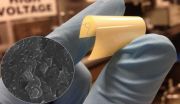Artificially evolved robots that efficiently self-organize tasks
Eliseo Ferrante and colleagues evolved complex robot behaviors using artificial evolution and detailed robotics simulations.
2015-08-06
(Press-News.org) Darwinian selection can be used to evolve robot controllers able to efficiently self-organize their tasks. Taking inspiration from the way in which ants organise their work and divide up tasks, Eliseo Ferrante and colleagues evolved complex robot behaviors using artificial evolution and detailed robotics simulations.
Just like social insects such as ants, bees or termites teams of robots display a self-organized division of labor in which the different robots automatically specialized into carrying out different subtasks in the group, says new research publishing in PLOS Computational Biology.
The field of 'swarm robotics' aims to use teams of small robots to explore complex environments, such as the moon or foreign planets. However, designing controllers that allow the robots to effectively organize themselves is no easy task.
The novel method developed by the team of scientists from the University of Leuven, the Free University of Brussels and the Middle East Technical University is based on grammatical evolution and Allows the evolution of behaviours that go beyond the complexity achieved before this study.
INFORMATION:
Image Caption: Artificially Evolved Robots that Efficiently Self-Organize Tasks
Image Credit: Ferrante et al.
Image Link: https://www.plos.org/wp-content/uploads/2015/08/Okada-14-May.png
All works published in PLOS Computational Biology are Open Access, which means that all content is immediately and freely available. Use this URL in your coverage to provide readers access to the paper upon publication: http://journals.plos.org/ploscompbiol/article?id=10.1371/journal.pcbi.1004273
Press-only preview: https://www.plos.org/wp-content/uploads/2015/08/pcbi.1004273.pdf
Contact: Eliseo Ferrante
Address: KULeuven
Biology
Naamsestraat 59
Leuven, B-3000
BELGIUM
Phone: +32488276842
Email: eliseo.ferrante@bio.kuleuven.be
Citation: Ferrante E, Turgut AE, Duéñez-Guzmán E, Dorigo M, Wenseleers T (2015) Evolution of Self-Organized Task Specialization in Robot Swarms. PLoS Comput Biol 11(8): e1004273.doi:10.1371/journal.pcbi.1004273
Funding: EF, AETand TW acknowledge the European Science Foundation "H2Swarm" program and the KU Leuven for the IDO-BioCo3 project and KULeuven Excellence Center project PF/2010/007. EDG acknowledges the KU Leuven for the Grant F+/11/033. MD acknowledges the Fonds de la Recherche Scientifique--FNRS (F.R.S.-FNRS--http://www.fnrs.be) and the European Research Council (ERC--erc.europa.eu) ERC Advanced Grant "E-SWARM: Engineering Swarm Intelligence Systems" (grant 246939). AETacknowledges the Scientific and Technological Research Council of Turkey (Tubitak--http://www.tubitak.gov.tr/en) grant TUBITAK-2219. The funders had no role in the study design, data collection and analysis, decision to publish, or preparation of the manuscript.
Competing Interests: The authors have declared that no competing interests exist.
About PLOS Computational Biology
PLOS Computational Biology features works of exceptional significance that further our understanding of living systems at all scales through the application of computational methods. All works published in PLOS Computational Biology are Open Access. All content is immediately available and subject only to the condition that the original authorship and source are properly attributed. Copyright is retained. For more information follow @PLOSCompBiol on Twitter or contact ploscompbiol@plos.org.
About PLOS
PLOS is a nonprofit publisher and advocacy organization founded to accelerate progress in science and medicine by leading a transformation in research communication. For more information, visit http://www.plos.org.
ELSE PRESS RELEASES FROM THIS DATE:
2015-08-06
Big data sets are important tools of modern science. Mining for correlations between millions of pieces of information can reveal vital relationships or predict future outcomes, such as risk factors for a disease or structures of new chemical compounds.
These mining operations are not without risk, however. Researchers can have a tough time telling when they have unearthed a nugget of truth, or what amounts to fool's gold: a correlation that seems to have predictive value but actually does not, as it results just from random chance.
A research team that bridges academia ...
2015-08-06
Autopsies of nearly every patient with the lethal neurodegenerative disorder amyotrophic lateral sclerosis (ALS), and many with frontotemporal dementia (FTD), show pathologists telltale clumps of a protein called TDP-43. Now, working with mouse and human cells, Johns Hopkins researchers report they have discovered the normal role of TDP-43 in cells and why its abnormal accumulation may cause disease.
In an article published Aug. 7 in Science, the researchers say TDP-43 is normally responsible for keeping unwanted stretches of the genetic material RNA, called cryptic ...
2015-08-06
For more than 20 years, Caltech geologist Jean-Philippe Avouac has collaborated with the Department of Mines and Geology of Nepal to study the Himalayas--the most active, above-water mountain range on Earth--to learn more about the processes that build mountains and trigger earthquakes. Over that period, he and his colleagues have installed a network of GPS stations in Nepal that allows them to monitor the way Earth's crust moves during and in between earthquakes. So when he heard on April 25 that a magnitude 7.8 earthquake had struck near Gorkha, Nepal, not far from Kathmandu, ...
2015-08-06
Case Western Reserve scientists may have uncovered a molecular mechanism that sets into motion dangerous infection in the feet and hands often occurring with uncontrolled diabetes. It appears that high blood sugar unleashes destructive molecules that interfere with the body's natural infection-control defenses.
The harmful molecules -- dicarbonyls -- are breakdown products of glucose that interfere with infection-controlling antimicrobial peptides known as beta-defensins. The Case Western Reserve team discovered how two dicarbonyls -- methylglyoxal (MGO) and glyoxal (GO) ...
2015-08-06
ROSEMONT, Ill.--According to a new study in the Journal of the American Academy of Orthopaedic Surgeons (JAAOS), imaging studies necessary to diagnose traumatic injuries sustained by pregnant women are safe when used properly.
During pregnancy, approximately 5 to 8 percent of women sustain traumatic injuries, including fractures and muscle tears. To help evaluate and manage these injuries, orthopaedic surgeons often recommend radiographs and other imaging studies. "While care should be taken to protect the fetus from exposure, most diagnostic studies are generally safe, ...
2015-08-06
Women experience more emotional pain following a breakup, but they also more fully recover, according to new research from Binghamton University.
Researchers from Binghamton University and University College London asked 5,705 participants in 96 countries to rate the emotional and physical pain of a breakup on a scale of one (none) to 10 (unbearable). They found that women tend to be more negatively affected by breakups, reporting higher levels of both physical and emotional pain. Women averaged 6.84 in terms of emotional anguish versus 6.58 in men. In terms of physical ...
2015-08-06
PITTSBURGH-- In the era of launching Kickstarter campaigns to pay for just about anything, Carnegie Mellon University ethicists warn that the trend of patients funding their own clinical trials may do more harm than good.
CMU's Danielle Wenner and Alex John London and McGill University's Jonathan Kimmelman co-wrote a column in Cell Stem Cell outlining how patient-funded trials may seem like a beneficial new way to involve more patients in research and establish new funding opportunities, but instead they threaten scientific rigor, relevance, efficiency and fairness.
"Patient-funded ...
2015-08-06
Easily manufactured, low cost, lightweight, flexible dielectric polymers that can operate at high temperatures may be the solution to energy storage and power conversion in electric vehicles and other high temperature applications, according to a team of Penn State engineers.
"Ceramics are usually the choice for energy storage dielectrics for high temperature applications, but they are heavy, weight is a consideration and they are often also brittle," said Qing Wang, professor of materials science and engineering, Penn State. "Polymers have a low working temperature and ...
2015-08-06
Researchers at USC have developed a yeast model to study a gene mutation that disrupts the duplication of DNA, causing massive damage to a cell's chromosomes, while somehow allowing the cell to continue dividing.
The result is a mess: Zombie cells that by all rights shouldn't be able to survive, let alone divide, with their chromosomes shattered and strung out between tiny micronuclei. Sometimes they're connected to each other by ultrafine DNA bridges. (Imagine tearing apart a hot pizza - these DNA bridges are like strings of cheese still draping between the separated ...
2015-08-06
WASHINGTON - The Society for Public Health Education (SOPHE) announces the publication of a Health Education & Behavior theme section devoted to the latest research on domestic violence prevention and the effectiveness of community coalitions in 19 states to prevent and reduce intimate partner violence. The theme section "DELTA PREP" (Domestic Violence Prevention Enhancement and Leadership Through Alliances and Preparing and Raising Expectations for Prevention) presents findings from a multi-site project supported by the Centers for Disease Control and Prevention (CDC) ...
LAST 30 PRESS RELEASES:
[Press-News.org] Artificially evolved robots that efficiently self-organize tasks
Eliseo Ferrante and colleagues evolved complex robot behaviors using artificial evolution and detailed robotics simulations.

